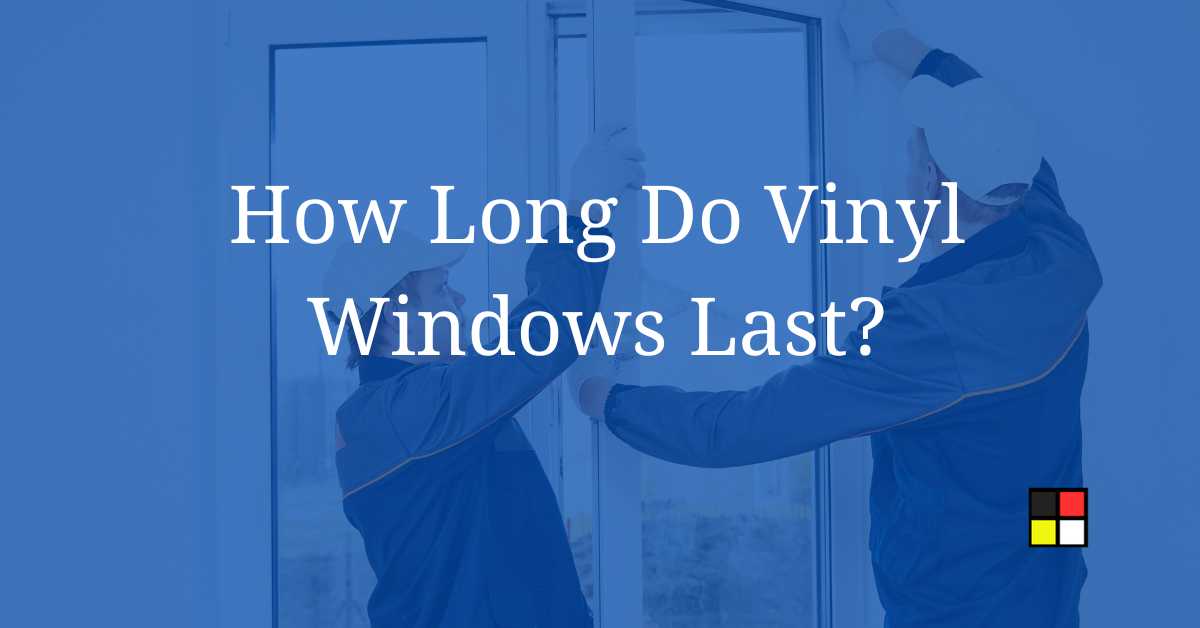When considering home renovations or new construction, the longevity and quality of materials are crucial factors in making decisions. Vinyl windows have become a popular choice due to their durability, cost-effectiveness, and low maintenance requirements.
They are designed to withstand the elements and provide energy efficiency for your home.
Understanding the expected lifespan of vinyl windows and the variables that affect their longevity can help you make informed decisions for your home improvement projects.
With proper maintenance, vinyl windows typically offer a substantial period of service before needing replacement.
However, several factors, including exposure to harsh weather, the quality of the window’s construction, and the level of care they receive, can influence their lifespan.
Advanced manufacturing techniques have improved the performance and durability of vinyl windows, making them a more reliable option now compared to earlier models.
Key Takeaways
- Vinyl windows are a durable and energy-efficient option for homes.
- The lifespan of vinyl windows can be extended with proper care and maintenance.
- Technological advancements have enhanced the quality and longevity of vinyl windows.
Fundamentals of Vinyl Window Durability
Vinyl windows, with their construction of PVC (polyvinyl chloride), offer an advantageous combination of features that contribute to their longevity:
- Low Thermal Conductivity: You’ll find that vinyl windows resist heat flow, maintaining your home’s temperature and reducing energy bills.
- Resistance to Elements: UV inhibitors within the vinyl stop the material from deteriorating due to sunlight. Also, vinyl does not rust, corrode, or warp, ensuring your windows withstand various weather conditions.
- Color Integration: The color in your vinyl windows runs consistently throughout the material, so small scratches don’t show easily and they largely maintain their appearance.
Regarding maintenance, vinyl windows require minimal effort on your part:
- Cleaning: Simply keep them clean with mild detergent and water.
- Checking Seals: Ensure the window seals remain intact to prevent air leaks.
The longevity of your vinyl windows is influenced by:
- Quality of Installation: Professional installation ensures optimal function and longevity.
- Product Quality: Higher-end vinyl windows are designed to last longer.
In terms of expected lifespan, a range from 20 to 40 years can be anticipated, contingent upon the aforementioned factors and regular maintenance. Select premium brands may extend this even further, with warranties often reflecting their longer service life.
Factors Affecting Vinyl Window Longevity
When selecting vinyl windows for your home, you should consider several factors that can influence their lifespan. Understanding these factors helps ensure the longevity of your investment.
- Quality of Materials: Higher-quality vinyl can withstand harsh environmental conditions and resist fading, warping, and cracking longer. Premium brands often offer lifetime warranties.
- Installation: Proper installation is pivotal. Incorrect installation can lead to air leaks and operational issues that decrease overall durability.
Climate: Your geographic location plays a significant role. For example, windows in coastal areas might not last as long due to corrosive saltwater spray.
Maintenance: Regular cleaning and maintenance can extend the life of your windows. Ensuring that your windows are properly cared for can prevent issues that may otherwise shorten their lifespan.Usage: The frequency of opening and closing the windows impacts the wear and tear on the hardware and frame.
- Sun Exposure: Constant exposure to direct sunlight can degrade the vinyl over time, leading to discoloration and brittleness.
By considering these factors, you can better gauge the expected lifespan of your vinyl windows and take steps to maximize their longevity.
Average Lifespan of Vinyl Windows
The durability of vinyl windows can be considerably long, but exactly how long can you expect yours to last? Typically, vinyl windows have an average lifespan of between 10 and 40 years. Factors such as window quality, maintenance, and environmental conditions play a pivotal role.
- Quality and Warranty: Higher-end vinyl windows, especially those with a lifetime warranty, might serve you well for over 30 years. It’s important to note though that ‘lifetime’ often refers to the expected life of the product, not the life of the homeowner.
- Maintenance Level: Your vinyl windows’ life expectancy increases with proper care. Regular cleaning and prompt repair of any damages ensure longer functionality.
- Environmental Impact: Environmental conditions dramatically impact lifespan. For instance, vinyl windows in coastal areas face corrosive saltwater spray, which can reduce their lifespan compared to those in more protected environments.
When considering the longevity of vinyl windows, the material’s resilience plays a key role. Vinyl is resistant to moisture and does not corrode, which aids in its longevity.
However, structural issues such as warping or yellowing due to UV exposure might shorten their effective service life.
To optimize your windows’ lifespan, you’ll want to opt for quality craftsmanship and ensure they are well-suited for your local climate.
Maintenance Tips for Extending Window Life
Proper maintenance can significantly extend the life of your vinyl windows, ensuring they remain functional and visually appealing for as long as possible.
Adhering to these tips could help your windows last for 20 to 40 years.
Cleaning and Care
Routine Cleaning: Keep your vinyl windows clean by wiping down the frames with a mild soap and water solution every few months. Avoid abrasive cleaners as they can damage the vinyl.
- Glass Care: Regularly clean the glass with a non-abrasive glass cleaner to prevent buildup of grime and mineral deposits.
Regular Inspections
Check Seals and Weatherstripping: Inspect the seals around your windows annually to ensure they are intact. Replace weatherstripping as needed to prevent drafts and energy loss.
- Hardware and Frames: Examine the window frames and moving parts. Lubricate the tracks and rollers yearly with silicone-based lubricants to preserve their smooth operation.
Timely Repairs
Promptly Address Damage: If you notice any cracks or air leaks, seal them as soon as possible to prevent further deterioration. Replacing damaged components immediately can prevent larger, more costly repairs.
- Professional Help: Consult a professional for significant repairs to guarantee they are handled correctly, as this can impact the longevity of your vinyl windows.
Signs of Window Replacement Need
When your vinyl windows begin to show signs of wear, it could signal the need for a replacement. Keep an eye out for these specific indicators to determine if it’s time to invest in new windows.
Visual Damage
- Cracks or Breaks: If you notice any cracks in the window glass or the vinyl frame, it’s a clear sign that your windows need attention.
- Discoloration: Vinyl windows that have yellowed or faded substantially often indicate material degradation and may compromise the window’s integrity.
Operational Issues
- Difficulty Opening or Closing: When your windows no longer open or close smoothly, it could be due to warping or damage to the frame.
- Persistent Drafts: Feeling a constant draft even when the window is shut tight suggests that the seals may be failing and it’s time to consider replacement.
Energy Efficiency Decline
- Increased Energy Bills: An unexplained increase in your heating or cooling bills may point to your windows’ loss of insulation and energy efficiency.
- Condensation: Moisture buildup between panes signals seal failure, leading to diminished energy performance and a need for window replacement.
Refer to these direct indicators to determine the health of your vinyl windows and whether they are due for a replacement.
Advancements in Vinyl Window Technology
In recent years, vinyl window technology has significantly improved, offering you enhanced durability and better energy efficiency. Modern manufacturing techniques have led to the production of vinyl windows that resist discoloration and warping, issues that used to plague older models.
- Enhanced Insulation: Today’s vinyl windows come with multiple layers of glass and improved sealing technology, which contributes to reduced heat transfer. This helps to regulate your home’s temperature more effectively.
- Superior Durability: Advancements in the chemical composition of vinyl have resulted in frames that withstand harsh environmental conditions without corroding or peeling.
- Low Maintenance: Unlike wood which may require periodic sanding and painting, vinyl’s color is integrated throughout the material, reducing the need for maintenance.
- Customization Options: With upgraded design options, you have access to a wider variety of colors and finishes, allowing you to customize your windows to fit your aesthetic preferences.
Notably, high-quality vinyl windows now come with special UV-resistant coatings, extending their lifespan while also protecting your home’s interior from sun damage. The introduction of reinforced profiles has increased structural stability, making vinyl windows more secure and better at noise reduction.
Advancements in hardware and locking mechanisms have not only improved the functionality of vinyl windows but have also contributed to their aesthetic appeal. As technology continues to evolve, you can anticipate ongoing improvements in the performance and longevity of vinyl windows for your home.
Frequently Asked Questions
When considering vinyl windows for your home, you may have several questions about their durability and longevity. Here’s what you need to know.
What is the typical lifespan of vinyl windows on a residence?
Vinyl windows are known for their durability, typically lasting between 20 to 40 years. Factors such as climate conditions, maintenance, and installation quality can influence their lifespan.
Are Andersen vinyl windows durable compared to other brands?
Andersen is a reputable brand known for quality. While brand comparisons vary, Andersen vinyl windows are designed to be durable and long-lasting, competing favorably with other high-quality brands.
After how many years should vinyl windows typically be replaced?
Replacement is often considered after 15 to 30 years, depending on the windows’ condition and performance. If the windows exhibit signs of wear and tear or inefficiency, it may be time to consider replacement.
Can vinyl windows effectively last 50 years with proper maintenance?
Although some sources suggest that well-maintained, high-quality vinyl windows can last up to 50 years, this is more common with fiberglass windows. Vinyl windows typically have a shorter lifespan.
Is it advisable to replace vinyl windows that are over 30 years old?
If your vinyl windows are over 30 years old and you’re noticing issues like drafts, decreased energy efficiency, or operability problems, it might be time to replace them to maintain home comfort and performance.
What are the disadvantages associated with installing vinyl windows?
While cost-effective and energy-efficient, vinyl windows can have some drawbacks, including a tendency to expand and contract with temperature changes, which can affect their seal and durability over time. They may also have limited color choices and finishes that can fade or discolor.






